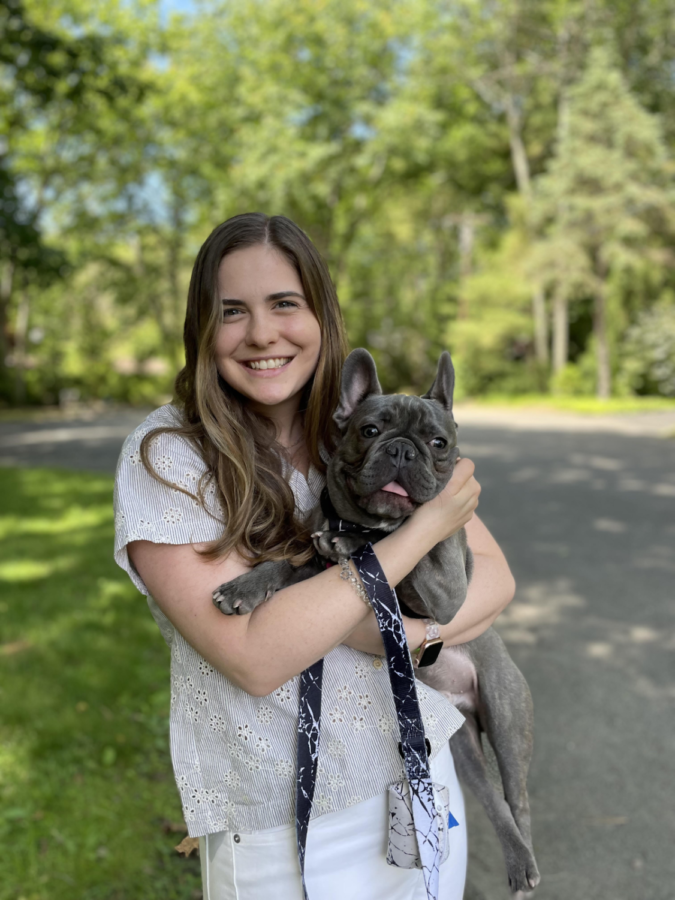Humans of WHS: Ms. Fodor
Ms. Fodor is a teacher who always has a smile on her face both in and out of the math classroom.
Tell me a story about yourself:
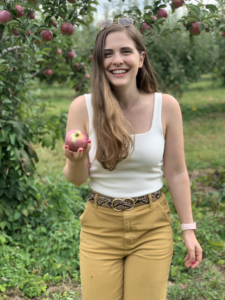
[Ms. Fodor]: “There is a really old song that I used to dance to when I was younger and it was ‘Just Breathe’. That’s a message I live by to this day” (Ms. Fodor)
I always like to look at the positive side of things, especially if there is a lot of negativity around it. That is a really large part of my personality, just keeping a bright outlook on life.
How did you get into teaching?
I taught fourth grade in my Hebrew school while I was in high school. Through this, I realized that I wanted to teach but, at that point, I wasn’t sure if I wanted to do elementary or secondary. I knew I wanted to teach math because I always liked math and math just made sense to me.
When I tutored at the middle school I found that it was a lot about managing the behavior of the kids and less about actual math. I loved the kids, but at the same time, that was when I decided I wanted to teach high school and also when I figured out what my path was.
You mentioned that you were drawn to math at an early age. Can you talk about this? What about math made you feel so comfortable and happy?
When my father moved to the country from Hungary at the age of ten, the only thing that he knew was math. After the Holocaust, my grandmother left Hungary and took my dad, her son, to America to stay with my great-uncle. When he went to school, the only thing he knew how to do was math.
When we were younger, he loved helping us with math because he believed that it made sense. He would show us how to do things and then teach us the Hungarian words for them. He would always make these practice math quizzes for us to do together. It was fun to do the quizzes and homework my dad gave us. Also, it was usually harder than the school assignments.
From a young age, I was raised to love math and I’ve always been drawn to its logical progression. You know there’s an answer. With other subjects, I was always second-guessing myself and asking questions like, “Is this right?” or “Is this what the teacher is looking for?” I just always knew that with math, if I did what I needed to do and practiced enough, then I would get it right. Also, it’s so cool because you might not speak the language, but math is attainable for everyone!
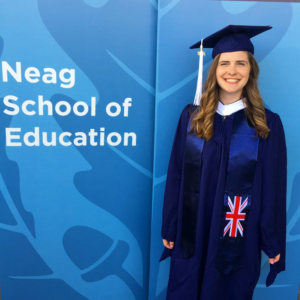
Can you talk a little bit about your experience teaching in England?
When I was in college at UCONN, there was a 5-year international exchange program. They had one in Cape Town, South Africa, and one in London. I wanted to go to London, but I knew they only took two math majors and there were 13 of us in the program. The odds were not in my favor, but my four close friends and I all reached out to our advisor who put together a program through Nottingham, England, a small city two hours north of London. I don’t know if you’ve ever heard of Robin Hood but that is where he’s from. The five of us were sent as the pilot, 4-month program to England to teach and do math service and global research.
We would come in and play games with the kids, and the kids would be like “What? We’re going to play games in math?”They had a very different perspective than us.
We did a lot of research on how to incorporate global education into our American curriculum. Another thing that I looked at was how to incorporate human rights into the math curriculum. This involved talking about statistics so that when young students watch the news and are exposed to all of this information, they can process it and understand it. Often the media will show math facts and expect that everyone can understand them. For example, sometimes it’ll say something like, “1 in 3 people feel a certain way about XYZ”. You can’t even understand what that means without math. To get students to understand the statistics earlier on, we started building a curriculum that included activism and human rights, which are more pertinent to what kids are exposed to all the time than just algebra.
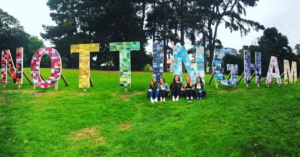
Favorite color=red
Favorite food=cookies
Astrological sign= Leo
Lucky number= 13 (Ms. Fodor)
How did you get here to WHS?
When I came home from Nottingham, I began interviewing for different teaching jobs. I grew up in Trumbull, and the only thing that I knew about Wilton was that it had an indoor track.
We had a UCONN job fair, and I knew a lot of schools from Fairfield County would be there, so I prepared a booklet for each of the schools that I was interested in. Wilton was the first one at the door, so when I walked into the career fair, I had my booklet ready along with a letter to Dr. O’Donnell and a letter to Dr. Smith. I also met Ms. Cherico at the door and got into a good conversation with her. She invited me back and I actually interviewed with her that same day at UCONN. I went to the Fairfield County job fair two weeks later and saw Ms. Cherico again and had my second interview for Wilton with Dr. Smith. Then, I applied for the job and did another interview. At that point, I knew everyone, so it was really funny when I finally came here.
The nice part about Wilton was that when I came for my demo lesson, (I taught Mr. Shpak’s class) they let me come an hour early. I’m that kind of person. I wanted to set up, make name tags and set everything up. I felt prepared whereas, when I went to other districts, they brought in a lot more people into the demos and tried to see how you would adjust to the stress. I felt like there was a trust factor in Wilton. I already knew so many people and I knew that they wanted me to have the best-case scenario. They wanted me to be prepared and they wanted me to show what I knew. Afterward, Ms. Cherico met with me, and we had a conversation that wasn’t like, “What did you do wrong?” It was more, “Can you explain why you did this?”
I felt like it was an actual conversation and open dialogue. I knew right then that I would rather be in Wilton than anywhere else because I could feel that it would always be an open dialogue.
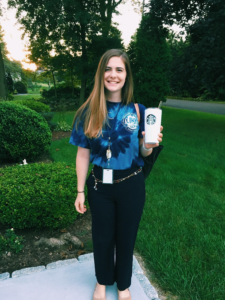
“There’s this common “I hate math” culture. So many people walk around saying that they hate math but so few people say the same thing about reading or other subjects. It has become very normal to hate math. I am trying little by little to help kids understand that it is possible to like math if you try hard and learn why you have to do the steps. Also, it might take four or five tries to understand a math topic, and that’s okay. (Ms. Fodor)
What is your teaching philosophy?
When I first started student teaching in Windsor, Connecticut in my senior year of college, I was teaching Honors Algebra 2-3, Precalculus, and Calculus. I remember looking at everything and wondering: “Why do we rationalize the denominator?” We spent a whole unit on it and I remember feeling there had to be a reason for it. I remember looking at everything and thinking that there must be a reason why. Also, when I was in high school, I remember thinking about math as something like following instructions. I’ve always been a rule follower and so I think when I started to get into education, I wanted to know WHY is this happening? Why do I have to do this? Why do I have to follow this rule? I always searched for that reason. Like WHY can’t you divide by zero? There’s a reason. WHY do you rationalize? There’s a reason.
I believe that anyone can do math. In more recent years I’ve taught more of the lower-level math classes and my goal with the students is that if they come in saying “I hate math,” if I can get them to say at least, “I can tolerate math” at the end of the year, then I have done my job. If you can just sit through a class, learn to ask questions, grasp just a small piece of a problem or a topic, or if a part clicks, then I have done my job.
Is there a person in your life that you’d say is influential and why?
That’s a good question. My dad is very influential. He came to the country with nothing, and then he didn’t go to college so that my uncle could go. He wanted his little brother to get an education so my uncle became an engineer and my dad ended up running his own business as a limo driver. He works hard and has always inspired me. Also, my mom is a very hard worker and always taught us to put in the work and get the job done but that family always comes first. I was always taught that at the end of the day, you only have what and who you are surrounded by, so you have to be thankful for it.
Do you have any hobbies or pastimes?
Haha, yeah! I teach dance at the studio I danced at during high school which is very funny. I teach contemporary pieces, hip-hop pieces, duets, and other small groups. It’s fun for me to stay connected to that because I danced my whole life. I love going back to make the dance and clean up the choreography.
I also love teaching dance because it shows the kids how to be resilient. It is very important to have something artistic to do and something that gets exercise in and can get competitive as well. But I always tell my dancers that it’s just for fun. We are just here to have a good time. I tell them to just go on stage and enjoy themselves. It’s okay to be hard on yourself sometimes or recognize that you made a mistake but, at the end of the day, it is just for fun and will not make or break your life.
When I went to college, I auditioned for a Division 1 team of 18 dancers. When my coach sent out a ranking list, I was 18 out of 18, the lowest on the list. I remember thinking “I don’t want to be 18 out of 18 next year, so I’m going to work as hard as I possibly can.” So I did. I worked hard and then the next year I was 6 out of 22, so I continued to move my way up throughout the years. I always say to my dancers that perseverance makes anything possible. At the end of the day, you can not make it your entire life. It’s just a small piece of it, just like school’s a small piece of you and your identity. You have to just take each part of life as it comes and not let one thing or mistake define you.
Yana Giannoutsos is a senior at Wilton High School. She is honored to be Co-Editor-in-Chief of the Forum. She has a passion for all genres of writing and is thrilled to display her passions, opinions, and thoughts through writing about the Wilton High School community this year. In her free time, Yana is either running, practicing yoga, or reading a good book.

